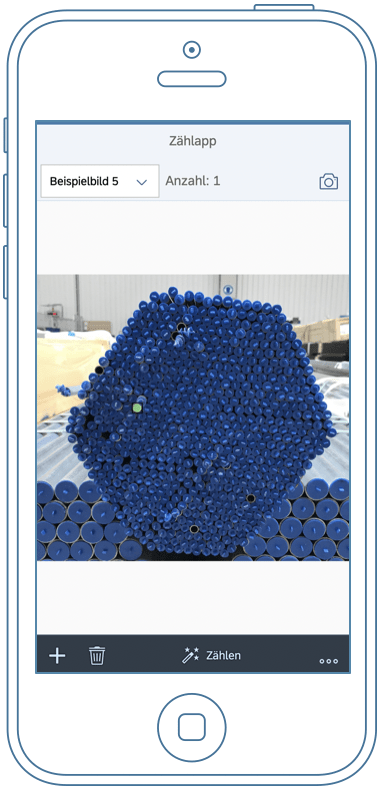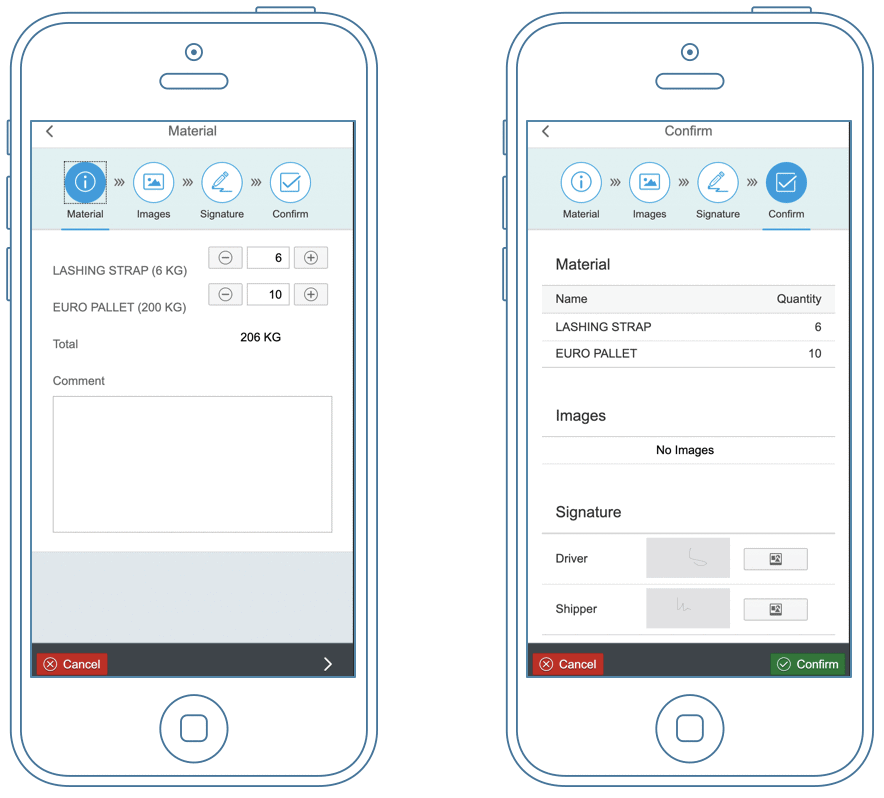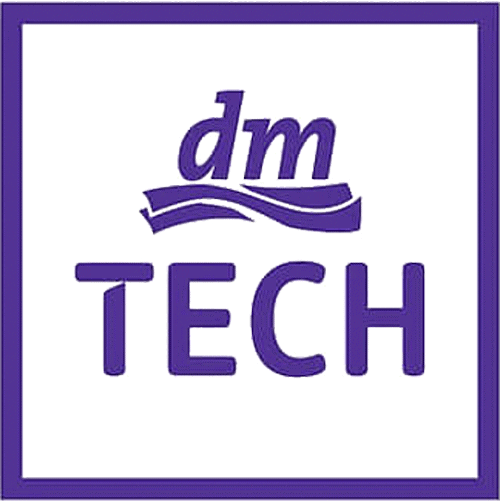The continuous change in our everyday life, driven by digitalization, automation, increased mobility and higher demands for speed, results in a great demand for small everyday helpers. Our shopping lists are smart, online and mobile. Our music collection can be accessed anytime, anywhere and we always carry our family photos with us.
This trend does not stop at the work environment either! We would like to record our working hours on a mobile basis. We immediately digitalize documents and invoices and file them. On the way from one work step to the next, we look at short reports to get an idea of our work area. We communicate via short messages in chat or act in a workflow by approving and rejecting requests.
What services in the field of logistics and supply chain management are requested by our customers? That’s what it’s all about today, when we provide an overview of value-added applications that can make your everyday work easier.
Smart Apps
When we are talking about small everyday helpers in the logistics environment, we usually mean apps that
- make one or more work steps much easier,
- increase the process reliability or
- lead to higher productivity.
We speak of “smart” when these are not just simple text entries and displays, but a certain process logic is built in.
This usually results in some basic requirements, four of which we would like to highlight below:
| Accessibility | Smart everyday helpers only bring any real added value if they run reliably and consistently. It is important that services in the frontend and backend are easily accessible. If under certain circumstances a workaround stands in the way of receiving or recording information, acceptance will be significantly lower! |
| User Experience | Similar effects on the acceptance have high user experiences. We are used to deal with modern messengers and social media apps - and in many cases these show us how to pack complex steps into simple designs. Only through self-explanatory, intuitive functions do we create added value compared to a manual alternative. |
| Offline-capability | Offline-capability is a requirement where our developer colleagues are always particularly sensitive to. If this requirement is incorporated too late into the process design and application development, the additional effort is enormous. However, if we have examined from the very beginning whether and to what extent a smart service can be used without an Internet connection, this can have a significant impact on the success of the application! |
| Mobility | The interaction of desktop UIs and mobile applications is a major success factor in our implementation projects: We allow information to be recorded where it is generated and at the same time enable process monitoring and control of the aggregated data in expert UIs on the desktop PC. Smart services generally make sense where they can be accessed on the move and make everyday work easier. |
Our portfolio of smart logistics services
Korrekte Verwaltung Der Einladefunktion Bei Digitalen Lösungen Sorgt Für Sicherheit
In most companies having warehouse management, recurring inventories are part of the daily work routine. To support you in this, leogistics offers the Counting App. With the help of machine learning and image recognition, this app enables you to take an image for the purpose of stocktaking and transmit it to the logistics platform myleo / dsc. There, the number and position of the recorded objects in the image is determined.

The result is displayed in the app and can be checked by the user. For counting, the app places a layer over the image on which each object is marked in color. These selections can be adjusted in case of errors and thus the counting can be corrected.
In doing so, the system learns from its mistakes, which leads to improved results in the next stock-taking. The entire process can be conveniently controlled via any mobile devices, such as tablets or smartphones.
Compared to a manual inventory, leo Counting can speed up the process many times over. The result can then be easily transferred to the continuing inventory system.
leo iDrive: Truck tracking and registration
With the mobile app leo iDrive, leogistics enables shippers, carriers and their drivers to use a wide range of interactive aids to map the daily process of checking in and out on the factory premises more reliably and digitally.
The precise arrival times in comparison to the planned data can be calculated by means of digitalized, paperless route planning including real-time reports of breaks and traffic-related delays and transmitted directly to those involved, such as the driver and subcontractors. This improves planning on the plant premises. Throughput and waiting times can be reduced by 25 percent.
IT-supported communication makes it possible to reduce media breaks. All information on shipping, delivery and schedules, including the real-time position of the driver, is recorded and stored directly in the app. This provides an overview and full control of all current tours at all times. In addition, the app can be used on the plant premises to identify the driver and vehicle, to call up the current driving orders and, following on from this, to coordinate the loading point call.
leo Load: Verification of cargo handling and securing
We provide the App leo Load for accurate planning and documentation of load securing. All load securing tools can be stored as master data. When used, all used loading aids are booked to the order and both the consumption can be tracked and the total weight of the load including securing can be determined.
Für eine akkurate Planung und Dokumentation der Ladungssicherung stellen wir die App leo Load bereit. Sämtliche Hilfsmittel zur Ladungssicherung können als Stammdaten hinterlegt werden. Bei Verwendung werden alle genutzten Ladehilfsmittel zum Auftrag gebucht und es kann sowohl der Verbrauch nachgehalten als auch das Gesamtgewicht der Ladung inklusive Sicherung ermittelt werden.

This helps to prevent possible overloading and ensures compliance with safety regulations.
Furthermore, the app contains a documentation function. Pictures of the load securing can be taken and saved with the order, in order to have a safeguard against recourse claims from the customer or the forwarder in case of possible load damage. The documentation, signed by the haulier and driver, makes it easy to trace who secured the load. Time stamps on the respective documents as well as data on the condition of the load and truck are also stored digitally so that all questions can be answered in the event of load damage.
leo Secure: Driver and vehicle checks at the gate
leogistics has developed the leo Secure App for audit-proof administration of driver and vehicle checks at the factory gate. All security-relevant questions can be answered in the app in a grouped manner and the results can be tracked in the system.
A set of rules can be used to control which checks and activities are to be carried out in relation to drivers and vehicles. Sorting functions can also be used to form queues based on various criteria in order to inform the personnel at the plant gate which activities are pending. The corresponding activities can be carried out and documented with a few clicks directly at the vehicle on mobile devices.
Your use case interests us
We at leogistics have long-standing logistical process experience. We also have substantial expertise in the areas of software architecture and user experience. You have a use case for which you are looking for a smart solution? Then contact us, we look forward to solving your everyday challenges!
If you have any questions about this or other topics on the blog, please contact blog@leogistics.com.
Jan-Philipp Horstmann
Jannik Bürckel
Consultants SAP logistics



